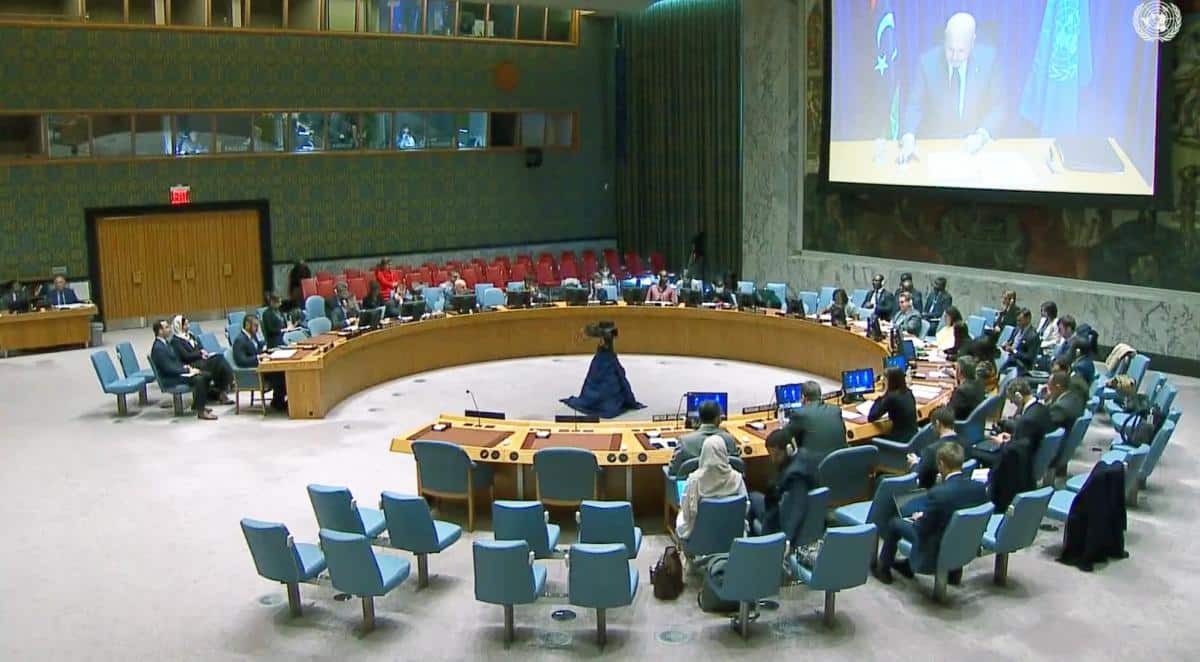Criminal Court Prosecutor Accelerates Work; Libya Must Respond

In a significant briefing to the United Nations Security Council, the Prosecutor of the International Criminal Court (ICC), Karim Khan, highlighted Libya’s commitment to cooperating with the Court in its pursuit of justice for victims of grave crimes. He urged Libyan authorities to hand over a suspect accused of serious offenses against detainees, including migrants and refugees. Khan’s remarks came alongside Libya’s recent declaration accepting the ICC’s jurisdiction from 2011 until the end of 2027, marking a pivotal moment for international justice efforts in the country.
Libya’s Commitment to Justice
During his address, Prosecutor Khan expressed optimism about Libya’s engagement with the ICC. He noted that the Registrar of the ICC confirmed receipt of Libya’s declaration under Article 12(3) of the Rome Statute, which allows non-party states to accept the Court’s jurisdiction for specific situations. This declaration is seen as a crucial step towards fostering collaboration between Libya and the ICC in addressing past atrocities. Khan emphasized that this renewed partnership could pave the way for accountability and justice for victims of crimes committed during and after the 2011 uprising against Muammar Qadhafi’s regime.
The ICC has been investigating various crimes in Libya, including those committed during the government’s violent crackdown on civilian protests in 2011 and subsequent conflicts. The ongoing instability in Libya, characterized by power struggles among armed groups and rival governments, has complicated efforts to achieve justice. Khan highlighted the importance of addressing the suffering endured by victims in detention facilities, which he referred to as a “black box of suffering” that has long been ignored.
Evidence Collection and Investigations
Khan detailed the ICC’s methodical approach to gathering evidence related to crimes in Libya. The investigations have relied on a diverse range of sources, including testimonies from survivors, forensic evidence, and verified video and audio recordings of the alleged crimes. Reports from the United Nations and various civil society organizations have also contributed to the body of evidence. This comprehensive approach aims to shed light on the atrocities committed in detention facilities, where many victims have suffered severe human rights violations.
One notable case discussed by Khan was that of Osama Elmasry Njeem, who oversaw prison facilities where these crimes allegedly occurred. Njeem was arrested by Italian authorities in January based on an ICC-issued warrant. However, his subsequent return to Libya raised concerns about the potential for justice. Khan urged Libyan authorities to surrender Njeem to the ICC, emphasizing the need for accountability for those accused of serious crimes against humanity.
International Reactions and Concerns
The briefing elicited various reactions from Security Council members. Representatives from Guyana and Slovenia welcomed the issuance of the arrest warrant for Njeem, viewing it as a significant step toward justice. However, concerns were raised about the implications of his return to Libya, with some delegates questioning the message it sends to victims and perpetrators alike. The representative from Sierra Leone highlighted the importance of impartial justice in healing societies and advancing national reconciliation.
Italy defended its decision to return Njeem, citing domestic security concerns and the principle of complementarity in the Court’s jurisdiction. Meanwhile, Libya’s delegate emphasized the need for positive cooperation between national and international judicial systems to ensure victims’ rights and achieve sustainable justice. Other nations, including Algeria and Somalia, echoed the call for a collaborative approach to justice in Libya, stressing the importance of national leadership in addressing these issues.
Challenges and the Path Forward
As the ICC continues its investigations, the need for credible prosecutions at the national level in Libya remains critical. The representative of the Republic of Korea underscored the importance of Libya being prepared to carry out effective legal proceedings. The United Kingdom also expressed its commitment to supporting the ICC’s work, including measures such as freezing Njeem’s bank accounts.
However, some Council members voiced skepticism about the ICC’s impartiality, with representatives from Russia and the United States raising concerns about the Court’s perceived politicization. They called for the ICC to maintain its independence and avoid becoming a tool for political agendas. In contrast, France reaffirmed its support for the ICC, commending the Prosecutor’s Office for its effectiveness and commitment to impartiality.
As the situation in Libya remains volatile, the need for accountability and justice is more pressing than ever. Continued international cooperation and support for the ICC’s efforts will be crucial in addressing the legacy of violence and ensuring a path toward lasting peace in the region.
Observer Voice is the one stop site for National, International news, Sports, Editor’s Choice, Art/culture contents, Quotes and much more. We also cover historical contents. Historical contents includes World History, Indian History, and what happened today. The website also covers Entertainment across the India and World.

